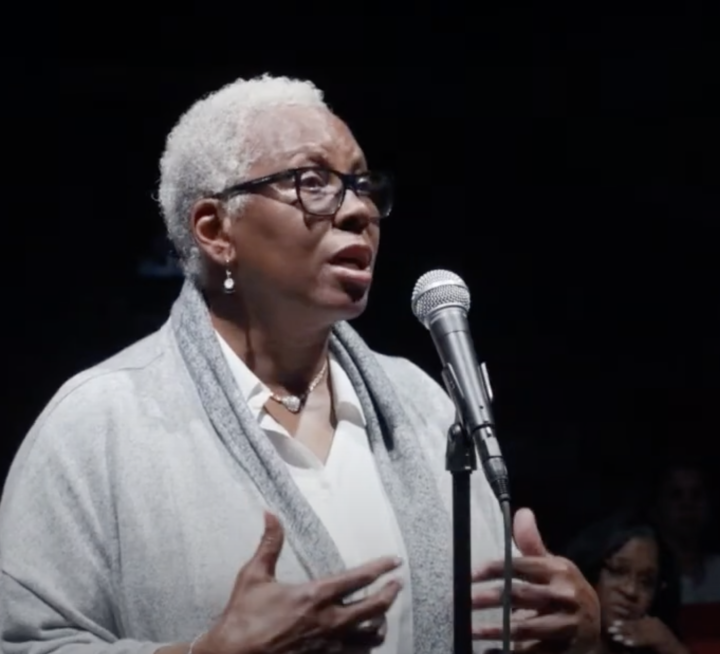Black American historian John Henrik Clarke once said, “History is a clock that people use to tell their political and cultural time of day; it is also a compass people use to find themselves on the map of human geography. … Most importantly, history tells people where they still must go and what they still must be..”
History informed the first session in Asheville’s Information Sharing and Truth Telling Speaker Series, a public engagement effort about the city government’s community reparations program. The June 3 event at the Thomas Wolfe Auditorium focused on the impact of city policies and practices that have led to structural inequity within the city’s Black population, such as redlining and segregation.
Roughly 100 people attended the discussion in person, while another 180 people viewed the event virtually and 45 people called in to listen by phone. Panelists included William Turner, author and former chair of the Department of Social Sciences at Winston-Salem State University; prominent civil rights attorney and Asheville native James Ferguson; and Sasha Mitchell, former chair of the Asheville Buncombe County African American Heritage Commission and a family and community historian. Darin Waters, UNC Asheville associate professor of history, moderated the event.
Community members were invited to share their stories and experiences and ask questions of the panelists. One Black speaker, who did not identify herself, said she attended Asheville High School in 1969 — the year of a walkout by Black students protesting their treatment in the newly integrated institution — and asked if the city’s reparations program could include diplomas to students who were expelled after the demonstration.
“It was not a riot. It was a peaceful demonstration because we felt like we were not looked at as equals,” she said. “Would reparations be a part of [those students getting] a diploma? Would they be able to get recognition for being part of our school system?”

Roy Harris, a local Black historian and 30-year Asheville resident, noted how the city’s Black population appears to be dwindling. And former City Council candidate and Black community activist Dee Williams asked the panel how to get more people involved in the reparations discussion.
“There is a problem, as you look around this auditorium. Many of the people who need to be here, who have been dramatically impacted — and since I’m a native, I’m one of them — they’re not in this room,” she said. “How do we stop being excluded?”
“This is the very beginning, as far as I know, the very beginning of this process,” panelist Mitchell explained. “The stories that you’re sharing, that’s part of it. There are definitions about reparations out there, but one thing is that it;s not just about money — although that’s a big part of it. It’s also about apology. It’s also about making sure and promising that it will never happen again.”
Meanwhile, Asheville resident and retired lawyer Sidney Bach questioned whether the legality of the city’s reparations program would hold up if challenged in court. “Before the city proceeds any further with a politically driven and divisive idea that will punish most of our citizens — Black and white — for past conditions that they had nothing to do with, it would be better if all of the city administration would first take the time and effort to inform itself of all federal court rulings and legal constraints that are applicable to any government attempt to adopt a race-based program,” said Bach, who is white.
“There’s nothing about this that’s race-based,” countered Ferguson. “This is based upon years of economic, psychic and virtually every kind of suffering you can talk about. And there’s no court that has said you cannot find ways to address governmental created and caused injury and suffering.”
Regardless of the legality of reparations, suggested Mitchell, conversations on the topic would likely continue to be contentious.
“The true cost of reparations is astronomical. People are going to be upset when they hear numbers, because the idea of just discussing this topic frightens people. But I would remind those people that Black families have borne those costs for generations,” she said. “To think of every hurt, every life lost to cruelty, every life cut short by violence, hampered by lack of education, lack of access to medical care, and every other hurt that’s come with injustice, the pain and the suffering can seem almost impossible to measure.”
Next steps
The speaker series is part of a three-phase process to create and empower a joint Asheville-Buncombe County Reparations Commission. Half of the commission’s up to 25 members would represent areas impacted by policies that have created economic disparities. The remaining half would be appointed by City Council and the county Board of Commissioners.
Once formed, the commission would be tasked with making short-, medium- and long-term recommendations to repair the damage caused by public and private systemic racism. Members are projected to be named by the end of August; its first recommendations would be presented to City Council and the community in January 2022, with a final report scheduled for the spring of 2023.
The next part of the speaker series will be held on Thursday, June 10, and focus on current trends and disparities within the Black community. The final presentation will occur on Thursday, June 17, and will focus on future initiatives. Both events will begin at 6 p.m. at the Thomas Wolfe Auditorium. Participants can attend in person, call in or watch the live stream at the city’s website. More information is available at avl.mx/9hn.
"first" - Google News
June 05, 2021 at 09:00PM
https://ift.tt/2Rs8ipf
First of three reparations talks draws hundreds of viewers - Mountain Xpress
"first" - Google News
https://ift.tt/2QqCv4E
https://ift.tt/3bWWEYd
Bagikan Berita Ini














0 Response to "First of three reparations talks draws hundreds of viewers - Mountain Xpress"
Post a Comment